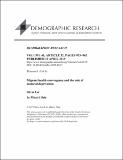Files in this item
Migrant health convergence and the role of material deprivation
Item metadata
| dc.contributor.author | Loi, Silvia | |
| dc.contributor.author | Hale, Jo Mhairi | |
| dc.date.accessioned | 2019-04-12T10:30:04Z | |
| dc.date.available | 2019-04-12T10:30:04Z | |
| dc.date.issued | 2019-04-12 | |
| dc.identifier | 257678838 | |
| dc.identifier | cff66b72-3e5b-4858-913f-60b3178f340e | |
| dc.identifier | 85066133219 | |
| dc.identifier | 000467153700001 | |
| dc.identifier.citation | Loi , S & Hale , J M 2019 , ' Migrant health convergence and the role of material deprivation ' , Demographic Research , vol. 40 , 32 , pp. 933-962 . https://doi.org/10.4054/DemRes.2019.40.32 | en |
| dc.identifier.issn | 1435-9871 | |
| dc.identifier.other | ORCID: /0000-0003-1343-3879/work/86538388 | |
| dc.identifier.uri | https://hdl.handle.net/10023/17511 | |
| dc.description | This work is financially supported by the Max Planck Society within the framework of the research initiative “The Challenges of Migration, Integration and Exclusion” (WiMi). | en |
| dc.description.abstract | BACKGROUND Cross–national research shows that although immigrants initially have better health than their native–born counterparts, their health deteriorates over time in their destination countries, converging to natives’ health (health convergence). Explanations include acculturation to negative health behaviours, exposure to low socioeconomic status, and social exclusion. OBJECTIVE This study is the first to examine how material deprivation, a measure of relative disadvantage that includes elements of SES and social exclusion, interacts with duration of stay to affect immigrants’ health convergence. METHODS Using data from Italy (2009), we assess the association between duration of stay and three health outcomes, and we estimate interaction effects of duration of stay with material deprivation. RESULTS We find immigrants’ duration of stay is negatively associated with self–rated health, chronic morbidities, and activity limitations. Immigrants’ health converges to natives’, net of controls. Convergence is most dramatic for self–rated health, but the pattern is also reflected in chronic morbidity and activity limitations. The health of immigrants who live in conditions of material deprivation is more similar to natives’ health at shorter durations of stay, compared to their not–deprived counterparts. CONTRIBUTION The paper contributes to a better understanding of the role of social exclusion – measured as material deprivation – on the immigrant–native health convergence process. It is the first to assess the interaction of material conditions to duration of stay in a host country. | |
| dc.format.extent | 751531 | |
| dc.language.iso | eng | |
| dc.relation.ispartof | Demographic Research | en |
| dc.subject | Immigration | en |
| dc.subject | Migrant health | en |
| dc.subject | Healthy immigrant effect | en |
| dc.subject | Health outcomes | en |
| dc.subject | Material deprivation | en |
| dc.subject | G Geography (General) | en |
| dc.subject | HM Sociology | en |
| dc.subject | H Social Sciences (General) | en |
| dc.subject | 3rd-DAS | en |
| dc.subject | SDG 10 - Reduced Inequalities | en |
| dc.subject.lcc | G1 | en |
| dc.subject.lcc | HM | en |
| dc.subject.lcc | H1 | en |
| dc.title | Migrant health convergence and the role of material deprivation | en |
| dc.type | Journal article | en |
| dc.contributor.institution | University of St Andrews. School of Geography & Sustainable Development | en |
| dc.identifier.doi | https://doi.org/10.4054/DemRes.2019.40.32 | |
| dc.description.status | Peer reviewed | en |
This item appears in the following Collection(s)
Items in the St Andrews Research Repository are protected by copyright, with all rights reserved, unless otherwise indicated.

